|
31 (17) Victoria Road
17 Prospect Place
 (
( No 7)
No 7)
Deal
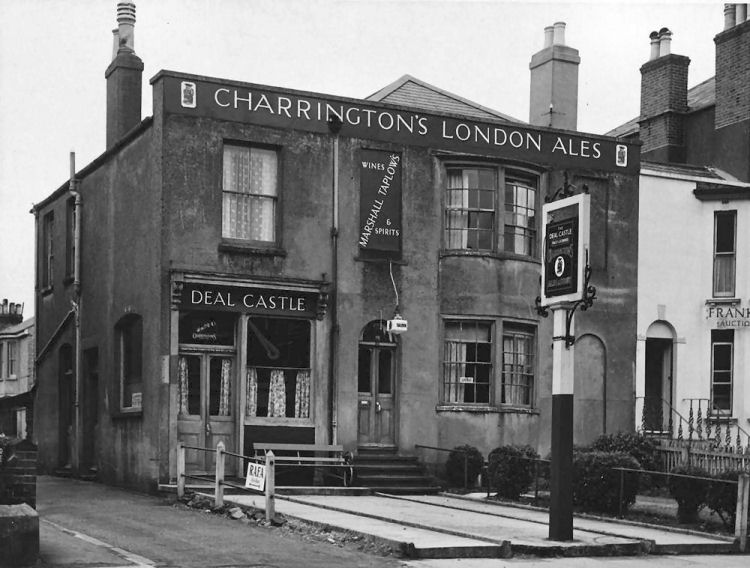
Above photo 1952.
Creative Commons Licence. |
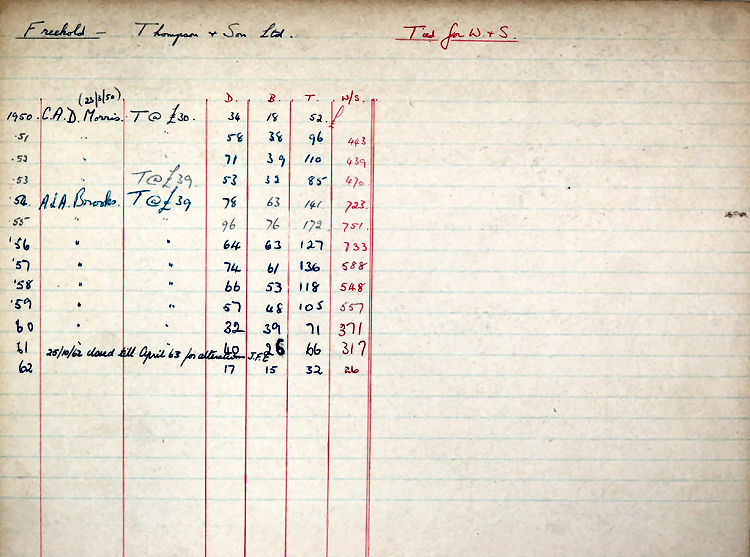
Thompson & Son ledger 1950-1962.
Creative Commons Licence. |
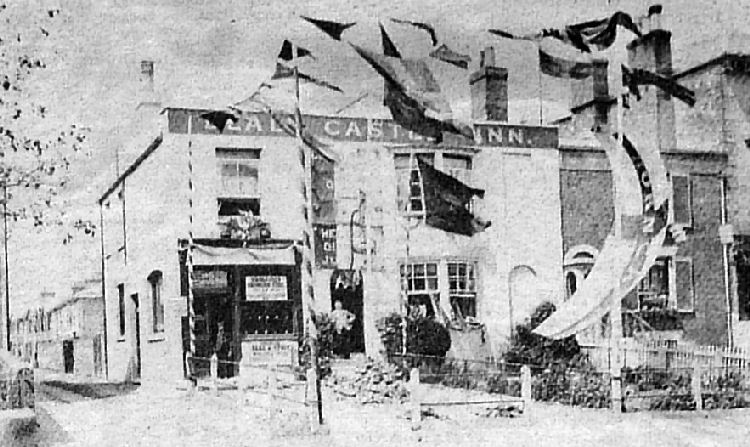
From the East Kent Mercury, Thursday, 8th September, 1977.
This superb picture of a near-forgotten Deal dates from Queen
Victoria's Diamond Jubilee in 1897. It was shown to the East Kent
Mercury by Mrs. Ann Lyons, of Church Path, Deal, who is a member of the
well-known Horncastle family, who then held the license of the "Deal
Castle Inn," in Victoria Road, Deal.
|
|
From the East Kent Mercury, Thursday, 20 May, 2010.
by Steve Glover and Michael Rogers.
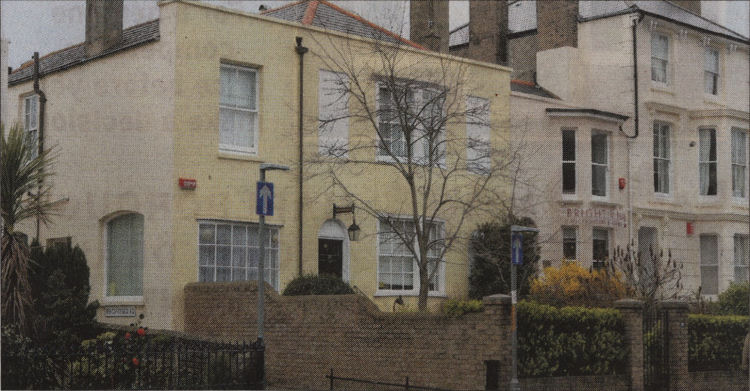
Above photo how it looks in 2010.
PC KEPT EYE ON PUBS AROUND CLOSING TIME
PROBABLY originally built as a private house in about 1750, the "Deal
Castle Inn" in Victoria Road, then known as Prospect Place, came into
being in the 1780s when Simon Amis was in residence.
His stay was
swiftly followed by local brewer Joseph Cobb. However, the first
conclusive record of the building being used as licensed premises came
in 1803 under the auspices of landlord Richard Piper.
The inn was opposite the old naval boatyard and would have been a very
popular watering place with its high-ranking employees, as well as with
the local military.
The Lodge of Union No 44, as well as The Grand Lodge of Ancient Free and
Accepted "Masons of England, held regular meetings there in 1818.
The Mercury reported in 1874 that landlord George Pearce (who was also
described as a 'wheelwright and licensed
victualler' by trade) was charged with late opening, being caught out by
the sharp eye of PC Shelvey Cox.
PC Cox patrolled the streets of Deal
for many years and often seemed to be in the vicinity of many local pubs
around closing time, according to numerous court reports!
In 1886, plans to turn the inn into "a new gin palace" did not
materialise, although a lengthy extension was added to the side of the
building, and a large upstairs room housing a stage and an auditorium
was used as a theatre-cum-music hall for some years.
The ground floor contained a
number of rooms, including a cosy wood-panelled snug bar with its own
fireplace, separated from the hall behind glass and wood-panelled
partitioning, and which still remains in situ.
At about lunchtime one afternoon in 1944, a bomb fell on to the rear
garden of the inn and partially demolished a house in nearby
Beaconsfield Road, causing one fatality.
The "Deal Castle Inn" closed in the early 1960s and the property is now a
private home.
|
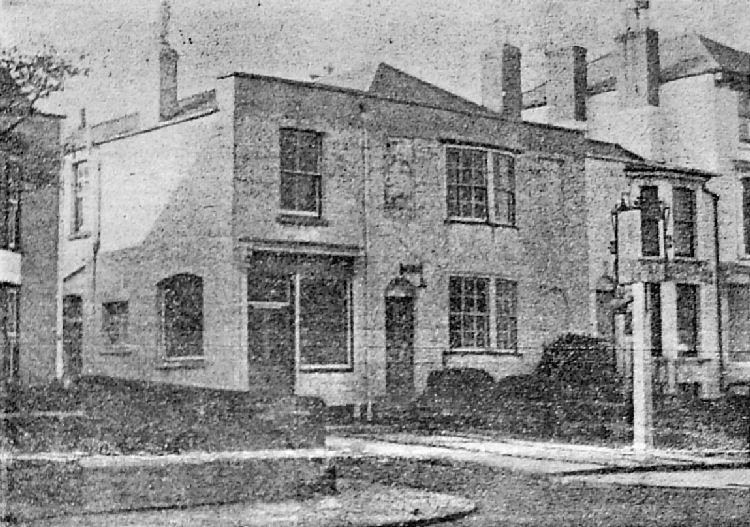
Picture above kindly supplied by Deal library. Newspaper cutting from East
Kent Mercury, Thursday, October 14th, 1965. |
Starting as a simple ale-house, early meetings (1818) of the Grand Lodge of
Masons were held here. Prospect Place, as the road was then called is now
renamed Victoria Road.
Licensee around 1871, William Terry Pettit, emigrated to Australia around
1840-50, but returned and was awarded the post of Mayor of Deal in 1862, he
afterwards managed the "Deal Castle Inn" but disappeared again about 1874,
by this time the pub was in the hands of Robert W Redman.
|
Weekly Post or Canterbury Journal 03 May 1808.
MARRIED.
April 27, at Upper Deal, Mr. Edward Trott, mariner, to Miss Piper,
daughter of Mr. Piper, landlord of the "Deal-Castle Inn."
|
|
From the Deal Borough Records Session Book, 23 March, 1818.
Lodge of Union No. 44 and part of the United Grand Lodge of
Ancient Free and Accepted Masons of England held at the Deal
Castle Inn (15 members).
|
|
From the Kentish Gazette, 4 January 1842.
DEAL. An Itinerant Thief.
On the night of Thursday, the 23rd ultimo, a fellow engaged a bed at the
"Deal Castle Inn," in this town, and decamped in the morning with a
blanket. He was traced through the town, having offered for sale, at
several places, two blankets and three sheets. We have since learned
that he, or a person answering his description, has stopped at a house
at Sandwich, from which he has stolen a sheet and a blanket. He was a
tall man, dressed in a short round frock and leather leggings, with a
white bundle, supposed to contain his ill-gotten spoil. As he is
believed to be gone on to Ramsgate, and from thence will advance to
Canterbury, it would be well for the proper authorities to be on the
alert to capture the miscreant.
|
|
Kentish Chronicle, Saturday 14 July 1866.
PETTY SESSIONS.
Mr. Seager sen., applied for the transfer of the license of the "Deal
Castle," public-house in Prospect Place from his son to himself, which
was granted.
|
|
From the Deal, Walmer, and Sandwich Mercury,
12 June, 1869. 1d.
ALLEGED ROBBERY FROM A PERSON
Sarah Bailey, 19, was charged with stealing from the person of
Frederick Dancer, a private in the Royal Marines stationed at Walmer,
the sum of 16s., at Walmer early the same morning.
Prosecutor who had two good conduct badges, said: I am a private in
the Royal Marines. Soon after midnight on Sunday I met the prisoner
opposite the "Deal Castle" public-house. I spoke to her, and she told me
she was going for a walk, but would come back to me. In about 20 minutes
she returned and we then went round by Deal Castle on to the beach. I
did not offer her any money, neither did she ask for any. After we left
the beach I put my hand in my pocket and missed my money. I had 16s. in
my pocket, varying a few coppers either way, which consisted mostly of
two-shilling pieces. I waited for the prisoner in the "Deal Castle"
public-house and she joined me there. I left barracks at about half-past
six or seven o'clock on the previous evening and I then had 19s. I am
quite certain that was the amount and it was all in a little bag - not a
purse. When i went round the castle with the prisoner I had at least
15s. in my tunic pocket. I had taken my money out whilst I was in the
public-house. The bag produced (by P.C. Brothers) I identified as my
property. I do not think I took the bag out of my pocket in the young
woman's presence - in fact I am sure I did not. I had it in my pocket
when we were going towards the beach, just after we had left the "Deal
Castle" public-house. Before I parted company with the young woman I
told her that whilst I had been with her I had lost 16s., which had been
in a bag in my tunic pocket. I did not charge her with stealing it, but
I told her my belief was that she had got it. I told her I should take
her to a policeman to be searched. She said she was quite willing to be
searched, and we walked towards Deal in search of a policeman. We met
police-constable "D6" at the bottom of Prospect Place, and I told him
that I had been with the girl and had lost 16s., and asked him to take
her to the station-house to be searched. He said, however, it was
nothing to do wit him, as it was not in his district. He also said there
was no police-station, which I told him was rather strange. The prisoner
then left and I went in search of the police-station.
Cross-examined by the Bench: I do not think the prisoner knew I had
the money. Whilst we were in the public-house I asked the prisoner to
drink with me, and she did so. There were from 15 to 16 persons standing
at the bar at the same time drinking. This was after the prisoner came
back to me. I was in the public-house waiting for her. I had four
glasses of ale and also two pints. The other persons present were
seafaring men, and they asked me to drink with them and in return I
asked them to drink with me. When they offered me their pot I drank as
much as I could, not a quart though - perhaps a glass and a half. I was
in the public-house about an hour. The prisoner did not attempt to
escape from me when I told her I had lost the money, but offered to
accompany me back to the beach to look for it, and also wanted to be
searched.
P.C. Carvey (the constable referred to by the prosecutor) deposed: I
was on duty on Sunday night. The first I saw of the prosecutor was at
the bar of the "Deal Castle" public-house about half-past 12 o'clock. I
was called by the landlord to turn out the prosecutor and others.
Prosecutor was very obstinate and did not seem inclined to go, and was
drunk. There were one or two women there, but I did not see the
prisoner. Prosecutor then went away towards barracks. About ten minutes
to two o'clock I met the prisoner and the prosecutor at the bottom of
Prospect Place. The prisoner came up to me and said, "D6, I want you to
take this girl in charge; she has robbed me of 16s." The girl remarked,
"I have done no such thing," and the prisoner added, "And I shall see
that you take the girl to the police-station." I then asked where the
robbery had taken place, and they told me the other side of the Deal
Castle, and I then said to the prosecutor, "If that is the case it does
not belong to me." The girl turned out all her pockets and offered to go
anywhere to be searched. I offered to go with the prosecutor to find
P.C. Ralph at Walmer, in whose district the alleged robbery was
committed, but he refused to go with me.
Prosecutor: I saw the policeman in the "Deal Castle" public-house
drinking. He did not turn me out of the house - he never spoke one word
or did anything to me. When I met him near Mr. Friend's he accused me of
being drunk and said he did not believe I had lost any money.
Carvey denied that he was drinking in the house, and said no doubt if
Mr. Pettit, the landlord, were called he would tell the Magistrates the
same as he had.
Mr. Hughes remarked that there was some difference between the
prosecutor's statement and that of the constable, as the former said he
and the girl left the house together, while the policeman said he turned
him out. He believed that the prosecutor had accused the constable of
drinking in the house by way of retaliation for having said that he was
drunk. When prosecutor was asked in his examination in chief about the
persons who were present at the "Deal Castle Inn," he did not mention
anything about the constable being present.
Prosecutor said the reason of that was that he had been told he had
nothing to do with the policeman till Thursday. The Superintendent of
the borough police could prove that he was not drunk when he made the
complaint at the station-house.
Carvey said that when the prosecutor reached the station-house it was
an hour later than when he saw him at the bottom of Prospect Place.
Prosecutor told him that he should report him to the superintendent for
drinking. The constable also added that Mr. Pettit's house was shut up
before the prosecutor and the other people entered, but that the door
was not locked as there was a private wedding party in the house.
A sergeant of marines said a comrade of prisoner who knew something
of the case had promised to be in attendance and give evidence, but he
believed that since then a sister or some other relation of the prisoner
had come across the man and that there was connivance and a desire to
hush the case up. When the prosecutor made his statement to the Colonel
he was perfectly sober, and said he wished to have the matter
investigated, and Colonel Rodney had requested him (the sergeant) to
inquire into the matter. Prosecutor had told P.C. Ralph that he could
take his oath that the prisoner took the money from him, which was very
different from what he had said that day, and his conduct would
therefore be reported to the Colonel. The sergeant also said that the
bag had been picked up near to where the constable and the girl had
stood.
In answer to the Magistrates P.S. Brothers said he picked up the bag
identified by the prosecutor as his property on the pavement at the
south end of Prospect Place.
P.C. Ralph said that he apprehended the prisoner at the house of her
mother, but no money was found upon her.
Prosecutor said he thought it was very wrong for the sergeant to say
that he had endeavoured to screen the girl, and appealed to the Bench to
express their opinion.
In answer, Magistrates said it was not for them tom pronounce whether
any connivance had taken place, because it was out of their
jurisdiction, but, on the evidence before them they must say that the
charge had not by any means been brought home to her. There was no
evidence to connect her legally with the robbery, and she would
therefore be discharged.
Prisoner thanked the Magistrates, and assured then that she was quite
innocent.
|
|
Kentish Gazette 15 June 1869.
DEAL. Borough Petty Sessions.
The Magistrates present at these sessions on Thursday were the Mayor. G.
Hughes, R. Hazell, and J. Iggulden, Esqrs.
Mr. W. T. Pettit, landlord of the "Deal Castle Inn," was in attendance
by order of the Mayor to explain how it was that his house was kept open
beyond the proper hour on Sunday night week, that fact having come out
in the course of the hearing a case that came before the Cinque Ports
Magistrates on the previous Monday and reported to the Mayor at the
request of one of the magistrates. Mr. Hughes who presided at the
hearing of the case on Monday, having stated the facts to the Bench, Mr.
Pettit accounted for them by saying that on the evening in question he
had had some parties in his house, and that whilst he was engaged in
serving them at the bar, the marine who was the prosecutor in the case
referred to knocked at the front door, and he, in order to avoid
annoyance to the neighbours, let him in, and at the same time one or two
others also obtained admittance. After they had been there a little
while he requested them to leave as it was past closing time, and
ultimately called in a policeman to clear the house, he assured the
Magistrates that he always endeavoured to keep his house quiet and
respectable, and if any one knocked at his door after the house was
closed, he served them as quickly and quietly as he could, in order that
they should not create a noise and annoy the neighbours. The Magistrates
said they did not think that Mr. Pettit was under any circumstances
justified in serving any customer after hours, and hinted that he must
abide strictly by the law.
|
|
From the Deal, Walmer, and Sandwich Mercury,
30 October, 1869. 1d.
ASSAULT CASE
Janice Larkins, waterman, was summoned for committing an assault upon
George Trott, another waterman, on the 21st of October. Defendant
pleaded not guilty.
George Trott deposed: About one o'clock on the morning of the 21st I
was going up Broad Street, in company with Larkins, having just bid
good-bye to a few captains who had been with me during the evening.
Larkins spoke to me about keeping him waiting, as he had arranged to
take the captain off, and I explained to him that the captain could not
get his business done till half-past nine, and that it had been arranged
that he should not go off that night if he could not get his business
done before dark. He then called me a liar, and I said "I thank you for
that," when he up with his fist and knocked me down on the pavement.
Whilst I was down he got hold of my hair, and beat my head on the
pavement several times, but I can't saw exactly how many. I said "For
God's sake don't kill me; let me get up," but he would not let me get up
till the policeman came and pulled him off. One of the policeman then
saw me home.
Cross-examined by Larkins: I did not hit you first. I did not hit you
at all - I did not have the chance to. I did not say whilst I was on the
ground, "If you let me get up I will give you New Zealand." I only said,
"For God's sake let me get up, let me get up."
Mr. E Hayward said: I live in Lower Street, near the bottom of Broad
Street. Of the night of the 21st, I should think soon after one o'clock,
I was in bed, and heard a great noise at the bottom of broad Street. I
heard some one say, "Let me get up; don't kill me." This was said
several times. There appeared to be a good many people there, and I was
surprised they allowed the man to be knocked about so. They appeared to
be watermen, and I should think there were five or six present. I heard
a noise like a man's head being knocked against the pavement, and I saw
a quantity of blood on the pavement in the morning. I don't know who the
people were, but several of the neighbours had their windows up. I did
not see the people, but I could tell there were several by their voices.
P.C. Pain said: There had been a bit of a noise at Prospect Place on
the night in question amongst the waterman about a Dutch captain who
they said was in the "Deal Castle Inn." As I and P.C. Brothers were
walking down we heard a loud talking in South Street, and on going there
we found these two men. They seemed to be friendly together, and they
both abused us because we would not suffer them to go into the "Deal
Castle Inn." There were one or two captains with them and also three or
four females. They had both had a little to drink, but were not so drunk
but that they knew what they were about. Brothers and I then went to the
"Deal Cutter" again, and as we came
down Prospect Place we heard a noise coming from Broad Street. On
getting beside the door of the "New Inn"
we saw Trott lying on the pavement and Larkins lying on top of him. We
saw no blow struck. Brothers and I both laid hold of Larkins and pulled
him off Trott. Complainant's face was all over blood and Larkins had
hold of him round the shoulder. Trott did not give Larkins in charge,
but as soon as he got up he said to me, "Will you see me home?" I said I
would, and Brothers and Romney then went away with Larkins. There was a
great quantity of blood on the pavement.
By Larkins: There was a row in the "Deal Castle Inn" before this, but
I did not see you there.
Trott said he had been in the "Deal Castle" with one or two captains,
and went outside, as also did one of the captains. Whilst outside
Larkins joined them, but he could not tell where he had come from. He
had not been in the public-house with them. He (Trott) then walked down
Prospect Place and parted from the captain at the corner of the Bank,
and was going up Broad Street home when Larkin assaulted him.
In defence Larkins said complainant was as bad if not worse than he
was, and had had the first pull out of him. As they were going up Broad
Street he asked Trott how it was he had kept them waiting so long, as
the business was done before eight o'clock, and he had said he should
only be half-an-hour, and it was then nearly one o'clock. Trott replied,
"It is no business of yours. We have been with the captain and two or
three of his friends." He then asked who was going to pay the men for
stopping up to take the captain off, and with that Trott caught hold of
him and "shoved" him round by the collar. At that time a Norwegian
captain who was going to sleep at his house left them and went away. No
one else was present. Larkins also said that as much blood came from
himself as from Trott. They had been wrangling all day.
Trott denied this, and said Larkins had not been waiting to take the
captain off, as it was arranged that the business were not done before
dark the captain would not go off till the morning. None of the other
men complained that they had been kept waiting.
The Court was then cleared and on the re-admittance of the public the
Mayor said: We consider this a very cruel and violent assault, and we
don't see anything to justify or excuse it. Even suppose Trott did,
after some irritating language on you part, lay hold of you, and as you
say sling you around - although he denies having done so - even had that
happened it did not in the least justify the violent assault that has
been committed. You will have to pay, including costs, a fine of 20s. or
in default go to prison with hard labour for 14 days.
Larkins addressing Trott: There's another 20s. gone. Are you going to
keep the young'uns and the old woman whilst I'm gone?
The money was paid.
|
|
From the Deal, Walmer, and Sandwich Mercury,
30 June, 1900.
WINDOW SMASHING CASE
Ellen Hunt was charged with wilfully and maliciously breaking two
panes of glass, doing damage to the amount of 15s., the property of
Frederick Bond Horncastle, on the 26th June.
On her first introduction to the Court, defendant fell on the floor,
and she had to be removed and attended to by the police. She was
accommodated with a chair on returning into Court, and when she had
become somewhat more composed, the case was proceeded with. Defendant
continually interrupted the proceedings, declaring that she had been
hardly done by, and accusing Mr. Horncastle of preventing her from
getting a house. Asked whether she would plead guilty or not guilty, she
said, "Oh yes, I did it."
Prosecutor deposed that he was the proprietor of the "Deal Castle
Inn." On the previous day, about half-past twelve, defendant entered the
front bar of his house, and accused him of preventing her from getting a
house. he could not understand what she meant by the remark. She became
most abusive, and threatened that she would smash every window in his
house and do for him, and she also made use of an insulting expression
towards him. He ordered her out of the house, but she would not go, and
he went round to the front of the bar and again requested her to go,
which she did. Outside the door she said something he did not quite
understand. he shut the door and put his foot against it to try to
prevent her from coming in, and she then attempted to break the glass in
the door. he returned to the bar immediately after she had left, and
while standing there he heard a tremendous crash, and found a hatchet
(produced), thrown by defendant, had come through his saloon bar window.
(Defendant: You've got to find the person who threw it.)
He then went for a constable, and on returning from the station he
was informed that another window had been broken, and he found that that
was the case. The windows were each about 2ft. 6ins. by 15ins. One had
"Saloon Bar" written on it, and the other had glacier decoration. He had
had an estimate of the cost of repairing the windows, amounting to 15s.
The hatchet also struck a stained-glass screen, but he had not taken any
notice of that. Defendant was perfectly sober. She was a tenant of his,
under notice to quit. He had not received any rent since April 9th, and
he could not get possession. He did not bear any malice, and he had not
said anything to her for the past two months. It was hardly likely that
he would try to prevent her from getting another house when he wanted
possession of his own property. Had anyone been in the saloon bar when
the hatchet came in, they might have been seriously injured.
Royston Garrett, aged 9, staying in Beaconsfield Road, said that he
saw defendant come out of the public-house and go into her house, which
was close by, and fetch a hatchet, and hit the window with it twice. It
broke the glass, and fell in. Defendant then got a rolling-pin and
smashed another window with it.
The Magistrates retired, and on returning into Court, the Mayor said
the defendant had pleaded guilty to a most unwarrantable outrage upon
another person's property. They did not wish to visit her with the
extreme penalty of the law, and they had in fact taken a lenient view of
the case, in the hope that this would be a lesson to her, but this was a
case in which punishment must be inflicted. The sentence of Court was
that she be fined 10s. and pay the costs 7s. 6d., and damage 15s., or in
default 14 days' hard labour.
Defendant: I'll go to prison.
Defendant's son, a bugler in the Marines, said he would pay the money
if the Magistrates would allow him a week in which to do so.
The Mayor: An application for time must come from defendant. (To
defendant). Cannot you be reasonable and ask for time?
Defendant: I should like to go to prison. It would be a change. I
can't work, because they have hurt my arm. I can't pay the money.
The Mayor: Your son says he will find it.
Defendant: I don't want to him.
The Mayor: We are bound to convict, but we are trying to give you
every opportunity. Why can't you be more reasonable? It is sad to see a
woman, and a mother of a family, here like this.
Defendant: And I think it very hard on a poor woman to be treated as
I have been.
Eventually defendant yielded to persuasion, and asked for a week to
find the money, which was allowed.
|
|
Canterbury Journal, Kentish Times and Farmers' Gazette 11 July 1903.
HOOKHAM—PILCHER.
On the 15th June, at the Church of St. Mary, Fordwich, by the Rector,
the Rev. Richard Hitchcock, Thomas Valentine Hookham, of "Deal Castle
Inn," Victoria Road, Deal, son of the late Mr. Hookham, Trinity Pilot,
of Dover, to Ellen Amelia, daughter of Frank and Annie Pilcher, of Stour
House, Fordwich.
|
LICENSEE LIST
1750 private house

AMIS Simon 1786

COBB Joseph 1791+

PIPER Richard 1803-08+

APPLETON Henry 1821+

APPLETON Elizabeth 1823-24+
 
WATTS Stephen 1826-40+ ( Prospect
Street)( Prospect
Street)(   Prospect Place) Prospect Place)
WATTS Elizabeth 1845-47+

SOLLY Henry 1861+ (age 30 in 1861 ) )
PETTITT William J 1868-71+ (widower age 48 in 1871 ) )
MORRIS C A D 23/Mar/1850-55
BROOKS A L A 1855
PARKER Mary Elizabeth 1858+

25/Oct/1862 closed till April/1863 for alterations.
SOLLY H C Jun 1862-65+

SEAGER Mr jun to July/1866
SEAGER Mr sen July/1866+
PETTIT William Terry 1869-July/71

REDMAN Robert W July/1871-74
  
PEARCE George 1874-91+ (age 39 in 1881 ) )
 
HORNCASTLE Frederick Bond 1899-1903
  
HOOKHAM Thomas Valentine 1903-48+
     
BROOKS A L A 1956+

Closed early 1960s
https://pubwiki.co.uk/DealCastle.shtml
http://www.closedpubs.co.uk/dealcastle.html
 From the Pigot's Directory 1823 From the Pigot's Directory 1823
 From the Pigot's Directory 1824 From the Pigot's Directory 1824
 From the Pigot's Directory 1828-29 From the Pigot's Directory 1828-29
 From the Pigot's Directory 1832-33-34 From the Pigot's Directory 1832-33-34
 From the Pigot's Directory 1839 From the Pigot's Directory 1839
 From the Pigot's Directory 1840 From the Pigot's Directory 1840
 From Bagshaw Directory 1847 From Bagshaw Directory 1847
 From Melville's Directory 1858 From Melville's Directory 1858
 From the Kelly's Directory 1862 From the Kelly's Directory 1862
 From the Post Office Directory 1874 From the Post Office Directory 1874
 From the Kelly's Directory 1874 From the Kelly's Directory 1874
 From the Post Office Directory 1882 From the Post Office Directory 1882
 From the Post Office Directory 1891 From the Post Office Directory 1891
 From the Kelly's Directory 1899 From the Kelly's Directory 1899
 From the Post Office Directory 1903 From the Post Office Directory 1903
 From the Kelly's Directory 1903 From the Kelly's Directory 1903
 From Pikes 1908 From Pikes 1908
 From the Post Office Directory 1913 From the Post Office Directory 1913
 Deal Library List 1914 Deal Library List 1914
 From the Post Office Directory 1922 From the Post Office Directory 1922
 From the Kelly's Directory 1934 From the Kelly's Directory 1934
 From the Post Office Directory 1938 From the Post Office Directory 1938
 The Old Pubs of Deal and Walmer by Glover and Rogers The Old Pubs of Deal and Walmer by Glover and Rogers
 Census Census
|




